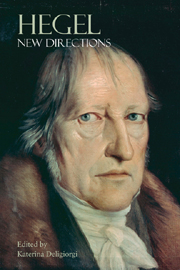Book contents
- Frontmatter
- Contents
- Contributors
- Acknowledgements
- Abbreviations
- Introduction: On reading Hegel today
- 1 Hegel on conscience and the history of moral philosophy
- 2 The apperceptive I and the empirical self: towards a heterodox reading of “Lordship and Bondage” in Hegel's Phenomenology
- 3 Hegel, McDowell and recent defences of Kant
- 4 Substance, subject and infinity: a case study of the role of logic in Hegel's system
- 5 Dialectic as logic of transformative processes
- 6 Hegel, ethics and the logic of universality
- 7 Recognition and reconciliation: actualized agency in Hegel's Jena Phenomenology
- 8 The contemporary relevance of Hegel's practical philosophy
- 9 Catching up with history: Hegel and abstract painting
- 10 New directions in Hegel's philosophy of nature
- 11 Hegel and the gospel according to Immanuel
- 12 What is conceptual history?
- 13 On Hegel's interpretation of Aristotle's psyche: a qualified defence
- Bibliography
- Index
4 - Substance, subject and infinity: a case study of the role of logic in Hegel's system
- Frontmatter
- Contents
- Contributors
- Acknowledgements
- Abbreviations
- Introduction: On reading Hegel today
- 1 Hegel on conscience and the history of moral philosophy
- 2 The apperceptive I and the empirical self: towards a heterodox reading of “Lordship and Bondage” in Hegel's Phenomenology
- 3 Hegel, McDowell and recent defences of Kant
- 4 Substance, subject and infinity: a case study of the role of logic in Hegel's system
- 5 Dialectic as logic of transformative processes
- 6 Hegel, ethics and the logic of universality
- 7 Recognition and reconciliation: actualized agency in Hegel's Jena Phenomenology
- 8 The contemporary relevance of Hegel's practical philosophy
- 9 Catching up with history: Hegel and abstract painting
- 10 New directions in Hegel's philosophy of nature
- 11 Hegel and the gospel according to Immanuel
- 12 What is conceptual history?
- 13 On Hegel's interpretation of Aristotle's psyche: a qualified defence
- Bibliography
- Index
Summary
In recent years a number of American interpreters, and certain continental readers strongly influenced by them, have defended an emphatically neopragmatic appropriation of Hegel's philosophy. For these interpreters the principal contribution of Hegelian thought is to be found in a fundamental thesis advanced in Hegel's Phenomenology. This thesis implies that our knowledge of ourselves and of the world is socially mediated, that our knowledge of ourselves and of reality in general is dependent on, and constituted by, intrinsically social parameters. Now this is not simply to ascribe to Hegel the manifestly trivial insight that our knowledge is somehow connected with particular contexts, situations and claims, and thereby inevitably requires a certain “social space” in order to present itself as a specific cognitive attitude to states of affairs in the world. For the interpretation in question would rather seek and find in Hegel a rather more extravagant, and perhaps “deeper”, insight; namely, that the concepts by means of which we speak of ourselves and the rest of reality, which we regard as the fundamental categories for describing the world and on which our understanding of reality itself is based, are already socially constituted. These concepts are socially constituted in the sense that they must be understood as the products of social practices, more precisely, of practices that reflect or express a particular way of giving and accepting reasons that is characteristic for a specific historical epoch or a specific cultural domain.
- Type
- Chapter
- Information
- HegelNew Directions, pp. 69 - 84Publisher: Acumen PublishingPrint publication year: 2006
- 6
- Cited by



